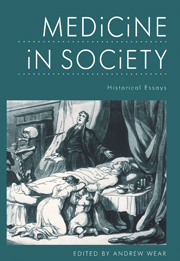Book contents
- Frontmatter
- Contents
- List of contributors
- Introduction
- Healers in the medical market place towards a social history of Graeco-Roman medicine
- Medicine and society in medieval Europe, 500-1500
- The patient in England, c. 1660–c. 1800
- Making sense of health and the environment in early modern England
- Medicine in the age of Enlightenment
- The rise of the modern hospital in Britain
- Medical practitioners 1750–1850 and the period of medical reform in Britain
- Public health, preventive medicine and professionalization: England and America in the nineteenth century
- Madness and its institutions
- From infectious to chronic diseases: changing patterns of sickness in the nineteenth and twentieth centuries
- Providers, ‘consumers’, the state and the delivery of health-care services in twentieth-century Britain
- The implications of increased life expectancy for family and social life
- Index
Public health, preventive medicine and professionalization: England and America in the nineteenth century
Published online by Cambridge University Press: 13 January 2010
- Frontmatter
- Contents
- List of contributors
- Introduction
- Healers in the medical market place towards a social history of Graeco-Roman medicine
- Medicine and society in medieval Europe, 500-1500
- The patient in England, c. 1660–c. 1800
- Making sense of health and the environment in early modern England
- Medicine in the age of Enlightenment
- The rise of the modern hospital in Britain
- Medical practitioners 1750–1850 and the period of medical reform in Britain
- Public health, preventive medicine and professionalization: England and America in the nineteenth century
- Madness and its institutions
- From infectious to chronic diseases: changing patterns of sickness in the nineteenth and twentieth centuries
- Providers, ‘consumers’, the state and the delivery of health-care services in twentieth-century Britain
- The implications of increased life expectancy for family and social life
- Index
Summary
Public health in both England and America began as a response to the social and health problems of rapid industrialization. Initially, the public health movement was created by social reformers including, but not led by, the medical profession. As public health became professionalized, physicians came to play a more dominant role. In England, the medical profession would eventually incorporate public health as ‘ preventive edicine ’. In the United States, public health would retain a certain independence from medicine; as the medical profession remained wedded to fee-for-service practice and displayed little interest in salaried public health positions, public health evolved as a somewhat separate professional specialty, staffed by biologists, statisticians, engineers, and others with specialized training. In both England and America, however, the professionalization of public health involved a certain distancing from the original social reform impulses which had given it birth. Scientific methods tempered, when they did not replace, the initial commitment to improving the lives and living standards of the poor.
A great expansion of public health as social reform began in France and Germany in the mid nineteenth century. 1848 was the year of revolutions in Europe. Social, economic and political crises in France and Germany were matched by the physical and health crises of urbanism in the industrializing nations of the continent. Growing epidemic diseases from the late eighteenth century had brought the health of the community in ever-more densely populated mass societies into the arena of European politics.
- Type
- Chapter
- Information
- Medicine in SocietyHistorical Essays, pp. 249 - 276Publisher: Cambridge University PressPrint publication year: 1992
- 6
- Cited by



